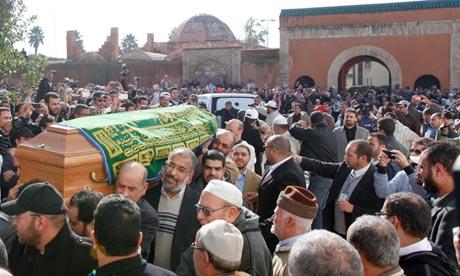 Mourners surround the coffin of Sheikh Abdessalam Yassine, who led the Justice and Spirituality opposition movement, in Rabat, Morocco, last Friday. Photograph: Abdeljalil Bounhar/AP
Mourners surround the coffin of Sheikh Abdessalam Yassine, who led the Justice and Spirituality opposition movement, in Rabat, Morocco, last Friday. Photograph: Abdeljalil Bounhar/AP
Islamism is often thought to be antithetical to Sufism, but in Morocco, a Sufi-inspired Islamist movement has represented the most potent opposition to the monarchy since the 1980s. The death of its mystical leader, Sheikh Abdessalam Yassine, last Thursday has left many asking what direction Morocco’s informal opposition will take.
Tens of thousands of people converged on Morocco’s capital, Rabat, to mourn the passing of Yassine, 84, the founder and spiritual leader of Morocco’s largest Islamic opposition movement, Justice and Spirituality (al Adl wal Ihsan), a nonviolent group committed to the peaceful overthrow of the monarchy.
The sheikh’s age and ill health had meant his public appearances had grown increasingly infrequent. Some even speculated that he may have died earlier and his death kept a secret from his devoted followers. According to Michael Willis, fellow in Moroccan and Mediterranean studies at Oxford University, Yassine’s death is a pivotal moment in the evolution of the movement: “The movement grew around him, all members read his key writings, he was at the center of things – but the movement had been preparing for his death for the last decade or so – there are structures in place.”
The central ideologue and spiritual guide, Yassine’s appeal combined religious and political leadership, something the movement will struggle to replace. Whether his successor’s legitimacy is premised on political or religious credentials could affect the nature of the movement and its popular appeal. In recent years, Yassine’s daughter Nadia, a media regular and French-educated author, has grown in public prominence. Like her father, her public defiance of the monarchy, including a 2005 statement that Morocco would be better off as a republic, saw her prosecuted and kept under surveillance. However, despite her popular appeal and charisma, it is unlikely she will take the helm in a deeply conservative country, where female leadership remains contentious. An interim successor has been appointed in the shape of Mohamed Abbadi, current head of the movement’s guidance council and No 2 in the movement.
The burning question for observers is whether the movement will reconsider a cornerstone of Yassine’s thinking – the rejection of the monarchy’s religious and political legitimacy. Such a move, favoured by younger members, would allow the movement to enter the political fray, but could ultimately undermine its oppositional appeal.
As for the monarch, the passing of such an inveterate opponent will be regarded with muted glee. For decades, the sheikh represented the face of popular dissidence, refusing to recognize the legitimacy of the monarchy and sending a succession of impudent letters to the successive kings, accusing them of squandering the people’s wealth and calling on them to return to the path of God. One such letter saw Yassine imprisoned in a psychiatric ward because it is alleged former king Hassan II could not conceive that any sane man would challenge his authority so brazenly. On Mohammed VI’s ascension in 1999, Yassine advised him to use his personal wealth, currently estimated at $2.5bn (£1.5bn), to eradicate the national debt. In a country with over 40% illiteracy and where more than a fifth of the population live in extreme poverty, the fact the king’s 12 palaces reportedly cost $1m a day to operate provides some fodder to Yassine’s call for social justice.
What’s more, in 2011, Yassine’s movement temporarily joined forces with Morocco’s pro-democracy 20 February movement, swelling crowds and increasing pressure on the king to undertake political reforms at a time when longstanding leaders were being deposed across the region. It was these protests that saw the enactment of constitutional reforms and the bringing forward of legislative elections, in which a rival Islamist party, the Justice and Development party (PJD), won a majority of seats. The concession of an Islamist government is widely considered to be the regime’s “last card” in its efforts to avoid relinquishing meaningful power.
With his potent message of Sufi piety and political dissent, Yassine embodied a truly Moroccan form of political protest in one of the most enduring authoritarian states, where window-dressing reforms have long tempered international criticism. His death is undoubtedly a blow to the movement’s religious leadership, but it remains to be seen whether it will negatively affect its political might. According to Michael Willis, “both Al Adl wal Ihsan and the 20 February movement are waiting for the PJD to run into trouble and support to ebb. Then the palace will have to turn to either one of them.” Yassine’s movement may yet have its day.
